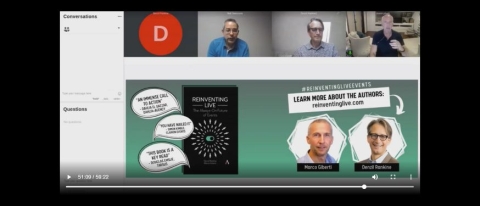Reinventing Live Events Begins With Embracing a New Culture, Authors Say in Webinar

Like much of the events industry, Denzil Rankine, executive chairman of AMR International, will have his eyes on World of Concrete, which will be the largest trade show to operate in-person since the pandemic. But he has a bit of a narrow focus — a minor point that he admits is his new pet peeve.
“I truly hope Freeman and GES have not been paid to print signs, ‘See you next year,’” he said during a webinar TSNN hosted covering the topics in “Reinventing Live,” a book Rankine co-authored with Marco Giberti, founder and CEO of Vesuvio Ventures.
Click here to watch a replay of the webinar.
You see, Rankine is a believer in the old axiom, “Don’t let a good crisis go to waste.” And there has been no larger challenge confronting the events industry than COVID-19. As trade shows, conventions and other large gatherings begin to reappear at convention centers and other venues, a new era of events will begin.
Experts like Rankine and Giberti, who have written multiple books about the industry they’ve been a part of for decades, will be watching to see what we’ve learned during the unwelcomed and unexpected hiatus.
“If World of Concrete, or any other event, comes back and it looks like 2019 then it is probably not good, because we're missing a fantastic opportunity for innovation,” Rankine said.
This leads us back to Rankine’s initial fear. Any “see you in 2022” message is a sign that organizers have not adopted the kind of mindset that he and Giberti both feel was necessary even prior to the pandemic.
“This whole industry needs to go through a major cultural change,” said Rankine. “It's a mistake now to think that you are purely an event organizer. You need to think of yourself as something else.”
That, they said, begins with doing away with classifying events as virtual, hybrid or in-person. Organizers need to maintain engagement with attendees year-round through a mix of digital and face-to-face experiences.
According to Giberti, a former planner for Apple and technology-driven consultant, trade shows 2.0 need to embrace the digital age.
“Technology is not the enemy, it is potentially your best friend,” he said. “Hybrid and virtual events are not new, they're at least a couple of decades old. COVID was a crash course on understanding technologies that are not new at all.”
Just as the pandemic was taking hold in the United States, the old friends and frequent collaborators were huddled together in Colorado talking about how there should be no distinction between offline and online in the events world. The conversation sparked the book, which has proven to be prescient in its analysis leading to the great reawakening.
As they discussed “Reinventing Live” with TSNN Editorial Director Matt Swenson, the authors pointed to prior failings that if corrected will mean only better things for trade shows. A key point, Rankine said, is that traditional events rely on 98% revenue from in-person meetings and only 2% from digital experiences. “When you think about it another way, that's $15 or $20 billion,” he added.
“Events as an industry was never famous for being fast, and innovative,” lamented Giberti. “We’ve not been showcasing ROI to exhibitors and to sponsors in a way that they can see that ROI on a digital world, and they're frustrated.”
He continued, “The challenge is 10 times more important because now all these customers have learned that some things are still going to be relevant face-to-face but other things can be done digitally in a more efficient way.”
Don’t miss any event-related news: Sign up for our weekly e-newsletter HERE and engage with us on Twitter, Facebook, LinkedIn and Instagram!


Add new comment